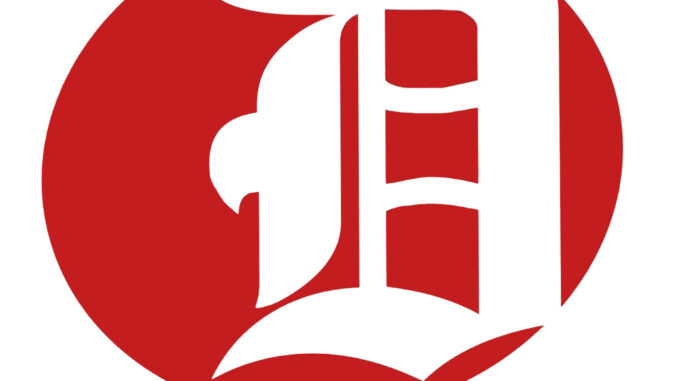
Emma Polen | Editor-in-Chief
Matt Canada is a great offensive coordinator and deserves his job.
Duquesne is a completely reasonable-priced higher education institution and students should actually be paying them more.
These opinions could be considered controversial, but they were the topics students were forced to support of at last week’s Society for Professional Journalism First Amendment Free Food Festival.
The event tested what could happen if free speech disappeared in America.
Each student who participated in the First Amendment event was handed a “propaganda passport” which had a topic of discussion they, as college students in Pittsburgh, were sure to disagree with. Throughout the event, any time the students said something controversial to their propaganda passport, they were called out for disagreeing with the law.
One student compared the event to playing Papers Please, a puzzle game where the player acts as propaganda for a communist country with [demanding] stresses against the player, their family in the game and their country.
Tanner Maue, a freshman who attended the event, gritted his teeth when having to say a statement that he truly did not believe in. His propaganda passport made him say that Steeler’s Offensive Coordinator Matt Canada is good at his job.
Freshman Isabel Arraes said the activity made her feel like she was in “1984” by George Orwell.
For her friend, Abby Zook, the challenge of either saying something she did not agree with or getting in trouble if she said the wrong thing brought her to a conclusion: “Just keep your mouth shut,” Zook said.
“It’s really hard to talk about something I don’t believe in, said freshman Naomi Girson.
SPJ displayed what a world without free speech could look like. Other campus organizations are navigating how being a private, catholic university might affect what they are allowed to say on campus.
According to a poll developed by the Foundation for Individual Rights and Expression, 50% of university students nationwide said they have self-censored on campus at least once or twice a month.
Yasmine Alrefai, the president of the Duquesne Muslim Student Association, shared how she is unsure what actions she is allowed to take on behalf of her organization, especially compared to students at public universities like the University of Pittsburgh.
“[There’s a] fine line between representing an organization and your own opinions,” Alrefai said. “I don’t know what I am and am not allowed to voice.”
Last week, the Pitt Students for Justice in Palestine held multiple rallies in reaction to the war between Israel and Hamas.
While Duquesne organizations might not be participating in equally public demonstrations, there are still opportunities on campus for students looking for support.
Alrefai helped begin the Muslim Student Association at Duquesne as a way for students who identified with the community to seek a space on campus.
“It’s new for me, too, so I’m still trying to find a way to create a voice for Muslim students on campus,” she said.
With support from faculty at the Center for Diversity and Inclusion and the Division of Mission and Identity, Alrefai advocated for changes to the campus meal schedule to make it more accessible to individuals who were fasting during Ramadan last year.
This year, the Muslim Student Association is fundraising for Charity Week, and they are ending the week (on Saturday Oct. 28) with a relay race for additional fundraising and prizes for students who win.
More information about the Muslim student community and events can be found on their Instagram, @duquesnemsa.
For students like M, the Muslim Student Association provided an opportunity to seek a community for herself.
An international doctorate student, who would like to be referred to as M to protect her identity due to the current war in Israel and Palestine, spoke about her outside perspective of freedom of speech at an American university.
“At least Americans have a stage to voice themselves,” M said.
She feels that Duquesne, and the United States generally, gives her plenty of avenues for expressing herself, although she does not take advantage of them.
“I never had it,” M said about free speech in her home country. “Teachers were thrown in jail for liking a Facebook post.”
For this reason, M shies away from the stereotypical platforms where college students voice their opinions publicly.
Overall, however, M has had a good experience from the faculty and staff at the university who allow her to express her thoughts. She is still attempting to break barriers between her and other students.
M is social, but she feels that other students do not approach her because she looks different than them with her hijab because, to them, she “looks weird.” Nonetheless, she goes out of her way to meet new people and attend social events on campus to carry on conversations with other students, she said, even if it means catching a later city bus home.
About the Catholic tradition that Duquesne supporters, “We’re actually the same,” Alrefai said. Like M, she believes that students could discover how much they have in common with other religious communities if they were open to talking together.
Sophomore Hannah Litke, a member of Catholic Ministries at Duquesne and a student in the school of education, shared the same view.
“It’s important to hear other people’s perspective sometimes, even if you don’t believe or agree with them,” she said.
Another member of Catholic organizations on campus, senior Clara Bergman, attended the Pennsylvania March for Life to exercise her right to free speech through campus’s Consistent Ethic of Life group, which joined Epiphany parish for their trip to Harrisburg. In the large group, she felt comfortable expressing her beliefs.
But on campus, Bergman said she holds back when she’s in class.
“[I] stay more quiet in class because it’s hard to read my professors and really truly believe they’d be open to me stating my beliefs,” she said.
However, joining Spiritan Campus Ministry means she has “been able to speak out.”

